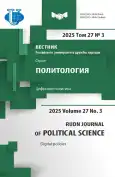Суверенитет цифрового пространства общественно-политических коммуникаций в современной России и его ключевые компоненты: по материалам экспертного исследования
- Авторы: Володенков С.В.1,2, Федорченко С.Н.1,2
-
Учреждения:
- Государственный академический университет гуманитарных наук
- Московский государственный университет имени М.В. Ломоносова
- Выпуск: Том 27, № 3 (2025): Цифровая политика
- Страницы: 520-542
- Раздел: ЦИФРОВОЙ СУВЕРЕНИТЕТ
- URL: https://journal-vniispk.ru/2313-1438/article/view/348834
- DOI: https://doi.org/10.22363/2313-1438-2025-27-3-520-542
- EDN: https://elibrary.ru/NJLOLX
- ID: 348834
Цитировать
Полный текст
Аннотация
В условиях глобальных технологических трансформаций цифровой коммуникационной сферы актуализируется проблема обеспечения цифрового суверенитета современного государства. Особо важное значение данная проблема имеет в сфере общественно-политических коммуникаций, характеризующейся значительным потенциалом воздействия на массовое сознание и трансформации традиционных духовно-нравственных и ценностно-смысловых основ жизнедеятельности государства и общества. Дополнительную значимость обозначенная проблема приобретает для России, находящейся в настоящее время в ситуации геополитического противостояния с коллективным Западом, многие страны которого являются технологически развитыми державами, претендующими на доминирующую роль в цифровом пространстве. Авторами изучены актуальные практики цифровизации в различных государствах мира, а также проведено международное экспертное исследование, на основе анализа результатов которого было сделано несколько ключевых выводов относительно содержания, структуры и степени универсальности моделей обеспечения суверенитета цифрового пространства общественно-политических коммуникаций. По итогам работы авторы приходят к выводу о том, что процессы суверенизации в современных государствах обладают национальной спецификой, что ставит вопрос о необходимости разработки модели цифровой суверенизации на основе национальных особенностей и в современной России. Кроме того, результаты проведенного исследования позволяют сделать вывод о том, что цифровой суверенитет пространства общественно-политических коммуникаций представляет собой единую систему взаимосвязанных между собой инфраструктурных, коммуникационных, технологических, кадровых, компетентностных, управленческих и содержательных (ценностно-смысловых) компонентов, обеспечивающих в своем единстве, достигаемом при помощи национального законодательства и практик его реализации, независимое и успешное функционирование в национальных интересах общественно-политической сферы жизнедеятельности современного государства в цифровом пространстве. Выявленные в ходе исследования ключевые компоненты системы цифрового суверенитета национального пространства общественно-политических коммуникаций могут быть положены в основу разработки собственной модели цифровой суверенизации современной России.
Об авторах
Сергей Владимирович Володенков
Государственный академический университет гуманитарных наук; Московский государственный университет имени М.В. Ломоносова
Автор, ответственный за переписку.
Email: s.v.cyber@gmail.com
ORCID iD: 0000-0003-2928-6068
доктор политических наук, профессор, главный научный сотрудник научно-проектного отдела Научно-инновационного управления, Государственный академический университет гуманитарных наук; профессор кафедры государственной политики факультета политологии, Московский государственный университет имени М.В. Ломоносова
Москва, Российская ФедерацияСергей Николаевич Федорченко
Государственный академический университет гуманитарных наук; Московский государственный университет имени М.В. Ломоносова
Email: s.n.fedorchenko@mail.ru
ORCID iD: 0000-0001-6563-044X
доктор политических наук, доцент, главный научный сотрудник научно-проектного отдела Научно-инновационного управления, Государственный академический университет гуманитарных наук; доцент кафедры истории и теории политики факультета политологии, Московский государственный университет имени М.В. Ломоносова
Москва, Российская ФедерацияСписок литературы
- Becerra, M., & Waisbord, S.R. (2021). The curious absence of cybernationalism in Latin America: Lessons for the study of digital sovereignty and governance. Communication and the Public, 6, (1–4), 67–79. http://doi.org/10.1177/20570473211046730 EDN: JRSZPA
- Buchinskaya, O.N. (2024). Digital colonization — a new phenomenon of the world economy. Economic science of modern Russia, (3), 78–92. (In Russian). http://doi.org/10.33293/1609-1442-2024-3(106)-78-92. EDN: UMWAOR
- Danilenkov, A.V. (2017). State sovereignty of the Russian Federation in the information and telecommunications network “Internet”. Lex Russica, (7), 154–165. (In Russian). http://doi.org/10.17803/1729-5920.2017.128.7.154-165 EDN: ZGLADJ
- Fedorchenko, S.N. (2023). State-civilization in the digital ecumene. Journal of Political Research, 7(1), 3–26. (In Russian). http://doi.org/10.12737/2587-6295-2023-7-1-3-26 EDN: YDIBNI
- Flonk, D., Jachtenfuchs, M., & Obendiek, A. (2024). Controlling internet content in the EU: towards digital sovereignty. Journal of European Public Policy, 31(8), 2316–2342. http://doi.org/10.1080/13501763.2024.2309179.
- Gupta, S., & Sony, R. (2021). Quest of data colonialism and cyber sovereignty: India’s strategic position in cyberspace. Legal Issues in the Digital Age, 2(2), 70–81. http://doi.org/10.17323/2713-2749.2021.2.68.81 EDN: ZUYQDF
- Hashemzadegan, A., & Gholami, A. (2022). Internet censorship in Iran: An inside look. Journal of Cyberspace Studies, 6(2), 183–204. http://doi.org/10.22059/jcss.2022.349715.1080.
- Kozyreva, A., Lewandowsky, S., & Hertwig, R. (2020). Citizens versus the Internet: Confronting digital challenges with cognitive tools. Psychological Science in the Public Interest, 21(3), 103–156. http://doi.org/10.1177/1529100620946707 EDN: NFILHV
- Kulikovsky, A.V. (2021). Possible launch of an autonomous Runet and its role in ensuring information security of the EAEU. Bulletin of the Tajik State University of Law, Business and Politics. Humanities Series, (2), 83–90. (In Russian). EDN: RBEAUT
- Kwet, M. (2019). Digital colonialism: US empire and the new imperialism in the Global South. Race & Clas, 60(4), 3–26. http://doi.org/10.1177/0306396818823172.
- Lehuedé, S. (2024). An alternative planetary future? Digital sovereignty frameworks and the decolonial option. Big Data & Society, 11(1), http://doi.org/10.1177/20539517231221778. Retrieved October 15, 2024, from: https://journals.sagepub.com/doi/10.1177/20539517231221778 EDN: BJUFCO
- Mann, M., & Daly, A. (2019). (Big) Data and the North-in-South: Australia’s informational imperialism and digital colonialism. Television and New Media, 20(4), 379–395. http://doi.org/10.1177/1527476418806091.
- Melnikova, O. (2022). China’s experience in protecting national cyber sovereignty. International Affairs, 12, 106–119. (In Russian). EDN: ASJJJF
- Panday, J., & Samdub, M.T. (2024). Promises and pitfalls of India’s AI industrial policy. In A. Kak & S.Myers West (Eds.), AI Nationalism(s): Global Industrial Policy Approaches to AI (pp. 85–104). AI Now Institute.
- Smorgunov, L.V. (2019). Institutionalization of controllability and the problem of control in the space of digital communications. South Russian Journal of Social Sciences, 20(3), 62–75. (In Russian). http://doi.org/10.31429/26190567-20-3-62-75. EDN: LLGQAM
- Urtaeva, E.B. (2024). The influence of social networks on the development of political communications in the new digital reality. Society: politics, economics, law, (3), 40–49. (In Russian). http://doi.org/10.24158/pep.2024.3.3. EDN: AYQJMS
- Vakhovsky, A.M. (2019). Sovereignization of the Internet as a problem of the modern political process. News of Tula State University. Humanities, (1), 11–18. (In Russian). http://doi.org/10.24411/2071-6141-2019-10101 EDN: QUHETJ
- Volodenkov, S.V. (2024). Digital actants and computational propaganda as tools for influencing mass consciousness in the context of global technological transformations. Bulletin of Moscow University. Series 12. Political sciences, (2), 47–70. (In Russian). http://doi.org/10.55959/MSU0868-4871-12-2024-2-2-47-70. EDN: FPYCYW
- Zhukov, A.Z., & Shugunov, T.L. (2020). Implementation of the law on the “sovereign RuNet”: Legal and technical aspects. Socio-political sciences, 10(2), 139–142. (In Russian). http://doi.org/10.33693/2223-0092-2020-10-2-139-142. EDN: WGPBUI
Дополнительные файлы









